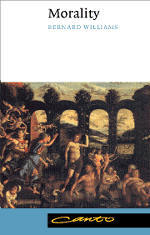Book contents
- Frontmatter
- Contents
- Preface to the Canto edition
- Preface
- MORALITY AN INTRODUCTION TO ETHICS
- The amoralist
- Subjectivism: First thoughts
- Interlude: Relativism
- Subjectivism: Further thoughts
- ‘Good’
- Goodness and roles
- Moral standards and the distinguishing mark of a man
- God, morality, and prudence
- What is morality about?
- Utilitarianism
The amoralist
Published online by Cambridge University Press: 05 April 2013
- Frontmatter
- Contents
- Preface to the Canto edition
- Preface
- MORALITY AN INTRODUCTION TO ETHICS
- The amoralist
- Subjectivism: First thoughts
- Interlude: Relativism
- Subjectivism: Further thoughts
- ‘Good’
- Goodness and roles
- Moral standards and the distinguishing mark of a man
- God, morality, and prudence
- What is morality about?
- Utilitarianism
Summary
‘WHY should I do anything?’ Two of the many ways of taking that question are these: as an expression of despair or hopelessness, when it means something like ‘Give me a reason for doing anything; everything is meaningless’; and as sounding a more defiant note, against morality, when it means something like ‘Why is there anything that I should, ought to, do?’
Even though we can paraphrase the question in the first spirit as ‘Give me a reason …’, it is very unclear that we can in fact give the man who asks it a reason – that, starting from so far down, we could argue him into caring about something. We might indeed ‘give him a reason’ in the sense of finding something that he is prepared to care about, but that is not inducing him to care by reasoning, and it is very doubtful whether there could be any such thing. What he needs is help, or hope, not reasonings. Of course it is true that if he stays alive he will be doing something, rather than something else, and thus in some absolutely minimal sense he has some sort of reason, some minimal preference, for doing those things rather than other things. But to point this out gets us hardly anywhere; he does those things just mechanically, perhaps, to keep going, and they mean nothing to him.
- Type
- Chapter
- Information
- MoralityAn Introduction to Ethics, pp. 3 - 13Publisher: Cambridge University PressPrint publication year: 1993
- 2
- Cited by



